Welcome to my side-blog to @renaultphile. Fred needed his own space, after all he was the most prolific writer in the universe! I hope you will join me in celebrating this wonderful (and enigmatic) writer.Background picture from Fred's book 'Winter Sports in Switzerland' by Mrs Aubrey Le Blond.
Don't wanna be here? Send us removal request.
Text
David Blaize and the Blue Door part two - recapturing the wisdom of the child....
One of my favourite themes of this book is also a poignant one - the story revolves around a boy's sense that the window of opportunity is closing - he will soon be an adult and 'fall asleep', losing touch with the 'real' world of imagination.

David Blaize and the Blue Door, EF Benson, 1918
This reminded me of a passage Fred wrote some time later, talking about his own creativity and imagination:
It is because the author draws from himself, that the hours in which his characters seem to take the tiller and steer for themselves comprise the best of his output. It is he, of course, who is really in command all the time, but that region or quality of his brain which knows him most nakedly and intimately is now in charge, and this holds the true compass and the key to such treasures as he possesses. All that he has ever experienced is in that store-house, sorted and arranged, and ready for him if he can only unlock the door and discover his own harvestings. But how difficult that is: in how arbitrary a manner the door swings back and excludes him, and seldom does it stand open for long, and few there are who refuse to write except when the door is open and they have free access to their best.
Mother, EF Benson, 1925
0 notes
Text
David Blaize and the Blue Door - part one
I read this a while ago out of curiosity. It is a sort of 'children's book' but a pretty strange one. It took a while to warm up for me but about halfway through it suddenly took off! I can definitely recommend it as bonus material for Fred and/or David Blaize fans. It is creepy, funny and touching in equal measure - I definitely recognised the anxiety dreams 😱
I couldn't help wondering about this analogy on page one....

David Blaize and the Blue Door, EF Benson, 1918
This reference to ice melting in a child's hand does not feel like a coincidence:

A Problem in Greek Ethics, John Addington Symonds, 1908
One of the reasons I think it is more than just a children's book!
#E.F. Benson#David Blaize and the Blue Door#Ancient Greek Love#David Blaize#John Addington Symonds#Literary connections
1 note
·
View note
Photo
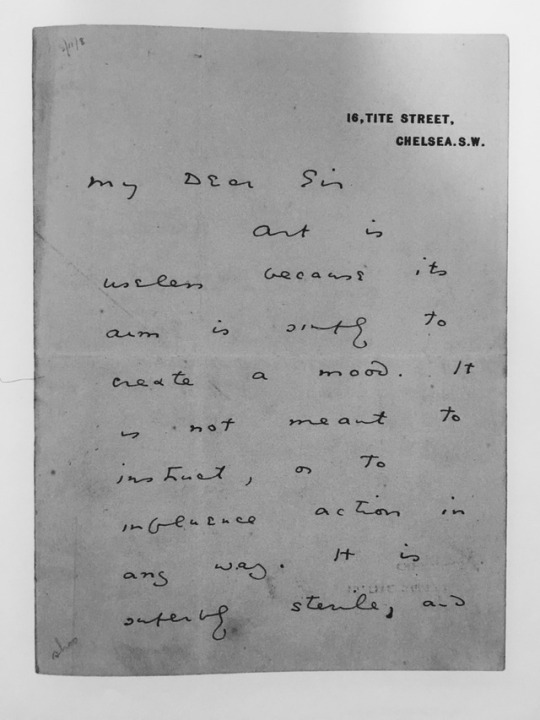
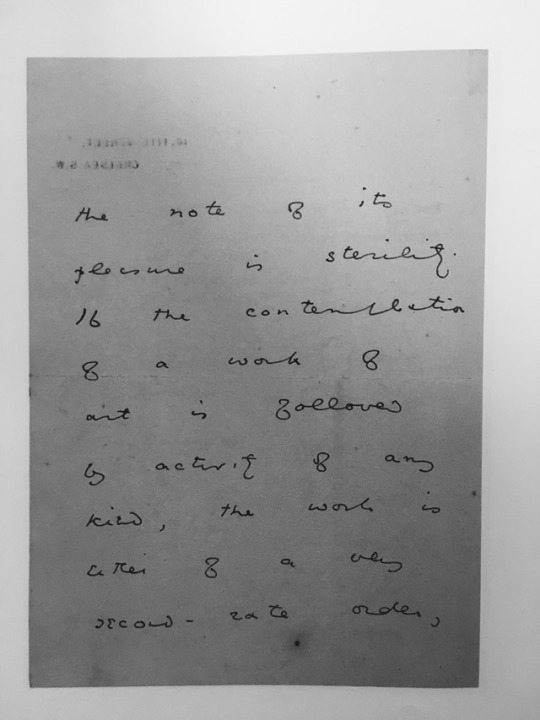
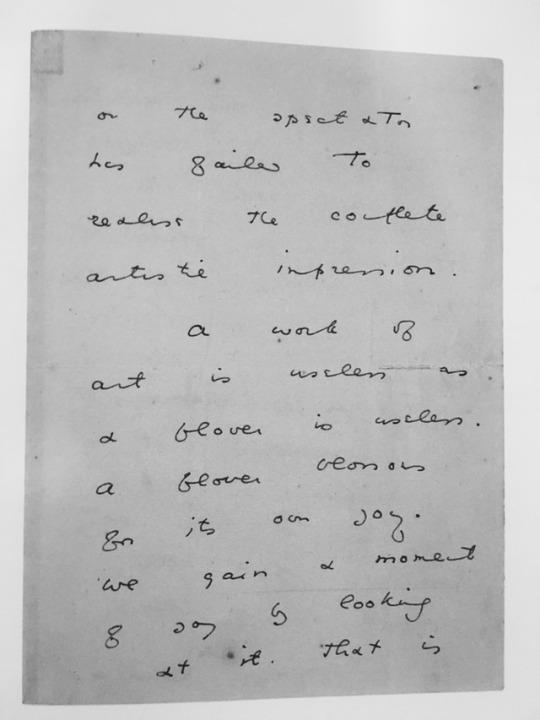
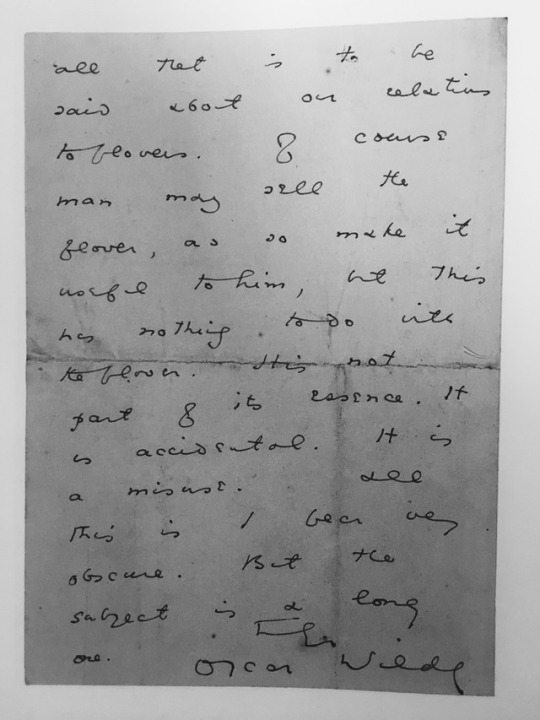
My dear sir,
art is useless because its aim is simply to create a mood. It is not meant to instruct, or to influence action in any way. It is superbly sterile, and the note of its pleasure is sterility. If the contemplation of a work of art is followed by activity of any kind, the work is either of a very second-rate order, or the spectator has failed to realise the complete artistic impression. A work of art is useless as a flower is useless. A flower blossoms for its own joy. We gain a moment of joy by looking at it. That is all that is to be said about our relations to flowers. Of course man may sell the flower, and so make it useful to him, but this has nothing to do with the flower. It is not part of its essence. It is accidental. It is a misuse. All this is I fear very obscure. But the subject is a long one. Truly yours, Oscar Wilde
(from TheMorgan)
1K notes
·
View notes
Text


Lobster a la Riseholme?
8 notes
·
View notes
Text
Hello again @yes-gigging-posts just pasting your answer to my ask here. I am in awe of your E.F. Benson collection, and you did it the hard way! All my reading so far has been courtesy of e-books and the Internet Archive. "Lucia novels the gateway drug" 😀 love it! I will add 'Secret Lives' to my list. Have you read any of his non-fiction, as in the memoirs or biographies?

2 notes
·
View notes
Text


SPOOK STORIES by E.F. Benson (London: Hutchison, no date) & MORE SPOOK STORIES by E.F. Benson (London: Hutchison, no date)
source
14 notes
·
View notes
Text

books unpacked this afternoon, part of the E.F. Benson collection, yes, I'm a fan, a true "Luciaphile"
18 notes
·
View notes
Text
25 Brompton Square


Nearly 100 years on from the cheeky little hit piece from Beverley Nichols about Fred's beloved London home, I thought it was time for a mini-pilgrimage.



It is still just about the most exclusive location you could find, with Harrod's and the Royal Albert Hall just around the corner. Unlike the grander London squares, it is a cul-de-sac with a narrow, long, beautifully manicured private garden running the length of it. Its appeal for the writer who liked to enjoy London society and then retreat home to write is obvious.

But the garden is a shared one with strict rules, so no nude sunbathing for you, Mr Benson!



1/2/3/4/5
8 notes
·
View notes
Text



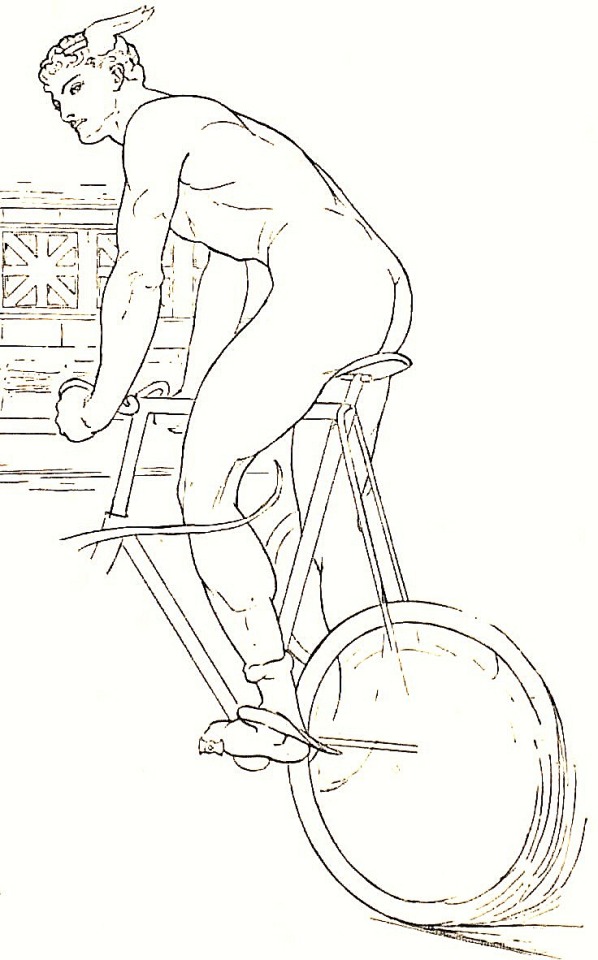


Selection of Otho Cushing’s illustrations — Part 2.
Parts: 1 / 2
#The Latin says#One day we will look back on this and smile#Otho Cushing#Greece#English Public school#Homoerotic#Fred in a nutshell 😊#E.F. Benson#David Blaize
62 notes
·
View notes
Text
Oh @eclare1000 I know this one! Yes, what with the name and physical description and the whole tortured scenario it felt very Frank-coded 🤔 Although of course the big question being, Who is Frank??
Just finished reading EF Benson’s ghost story, ‘The Man Who Went Too Far’ and very struck by this description of the protagonist - who is called Frank, no less!
He was of medium height and rather slender in build, but the supple ease and grace of his movements gave the impression of great physical strength […] His face and hands were of very dark complexion […] His head was small, his face of an exquisite beauty of modelling […] His head, covered very thickly with a somewhat rebellious crop of short curly hair…
4 notes
·
View notes
Text

Edward Carpenter was at the forefront of British romantic socialism, whose philosophy was inspired by Walt Whitman but had a clear political agenda and active "engagement" to radically reform social institutions. He practiced what he preached, giving away most of his money and earning a subsistence living as a sandal-maker as well as lecturer and journalist. His book of poetry Towards Democracy, consciously modelled upon Whitman’s Calamus poems, is a forthright celebration of gay love. George Merrill was an uneducated odd-job man from the slums whom Carpenter first met at a railway station in 1891 and with whom he eventually developed a romantic relationship. Carpenter described him as "the most interesting and satisfying character I have ever met. Knowing as I do thousands of people of all classes—and many very intimately—I still doubt whether I found anyone more natively human, loving and affectionate, and withal endowed with more generous good sense and tact than he." Carpenter’s philosophy of brotherhood was no abstract concept; he had occasional affairs with some of the intellectuals and gay writers who came on pilgrimage to his home at Millthorpe, and Merrill had occasional flings with hired hands and the local farm boys. Merrill served as a model for the game-keeper in E. M. Forster’s gay novel Maurice, which Forster acknowledged was a direct result of a visit to Carpenter.


In his later years, Merrill would often be found drunk and incapable in their front garden; but Carpenter’s affection never wavered. Fairness makes it necessary to add that Merrill was a gay fellow, naturally musical—he would sing Schubert while Carpenter accompanied him on the piano—and expert at housekeeping. While inclined to be moody, he could be the life and soul of the party. His early letters to Carpenter testify to a genuine affection. He once chased away a clergyman who came to the door to give him a tract: "Keep your tract," said Merrill, "I don’t want it. Can’t you see we’re in heaven here—We don’t want any better than this, so go away." Carpenter took Merrill to live with him at Millthorpe in 1898, and they remained together till the latter’s death in 1928. "They are putting him in the cold earth," Carpenter cried, and for the short remainder of his life he seemed but the ghost of a man. A year later, he was buried in the same grave.

— Rictor Norton, My Dear Boy: Gay Letters Through the Centuries (1998) & Edward Carpenter, Edward Carpenter: A Restatement and Reappraisal (1970)
486 notes
·
View notes
Text

I thought I should just highlight this fantastic caricature of Fred which featured in @alovelywaytospendanevening's recent post.
It's from Michael Willhoite's 1993 book 'Members of the tribe: caricatures of gay men and lesbians'. I love the pen portrait too 😃
#comic novels with a gay sensibility so thick you could spread it on a scone....#E.F. Benson#Michael Willhoite#1990s#Illustrations#Humour#Gay history
4 notes
·
View notes
Note
Thank you and as always it was worth the wait! Yes, I am very intrigued by this approach and the possibilities of it. It makes a lot of sense to me given the tone of the novel, and in its own way it does say a lot. It makes me think of that description he gives in his memoirs of sleeping outdoors with Francis Yeats Brown, his 'friend'. Whatever he meant by it, he was obviously confident enough to mention him by name, plausible deniability, and yet, it is so full of feeling. I have to say on the re-read I was amazed, nay shocked, at how explicit he was about sex in general. And I think he does something similar at times in Mapp and Lucia. I'd love to know what his gay friends thought of it all!
Hello, asking for a friend 😉, I think you mentioned before that 'David of Kings' was a 'great' book because it managed to say so much at a time when options were limited. I recently re-read and was amazed at how much I had missed the first time round, but I would love to hear more of your thoughts on the topic....
Hey,
I would say the original David Blaize has the edge in the "saying a lot in a time when options were limited" category — though I think David of King's is the superior novel.
Apprehension about homosexuality is David Blaize's main conflict; there is always a hint of tension hanging over the plot, despite it being a lighthearted novel overall. This feeling fades in David of King's, because, as I mentioned to you some days ago, Benson kinda treats David and Frank as if they were in a established relationship, without further bothering to discuss the implications of such a situation.
Having said that, one of David of King's greatest strengths is its charming portrayal of Edwardian society, and yeah, Benson can be quite suggestive about things he felt should not be said aloud (like that scene with David and the "cocoon").
Sorry I took so long to answer this one, by the way! 😉
8 notes
·
View notes
Video
i love gay people
44 notes
·
View notes
Text

The Mapp and Lucia Novels by E.F. Benson Edward Frederic Benson OBE (24 July 1867 – 29 February 1940) was an English novelist, biographer, memoirist, historian and short story writer. Arguably best known for Mapp and Lucia , a series of novels that feature humorous incidents in the lives of (mainly) upper-middle-class British characters in the 1920s and 1930s, who vie for social prestige and one-upmanship in an atmosphere of extreme cultural snobbery. Benson was an intensely discreet homosexual. At Cambridge, he fell in love with several fellow students, including Vincent Yorke (father of the novelist Henry Green), about whom he confided to his diary, "I feel perfectly mad about him just now... Ah, if only he knew, and yet I think he does." In later life, Benson maintained friendships with a wide circle of homosexual men and shared a villa on the Italian island of Capri with John Ellingham Brooks; before the First World War, the island had been popular with wealthy homosexual men.
Homoeroticism and a general homosexual sensibility suffuse his literary works, such as David Blaize (1916), and his most popular works are famed for their wry and dry camp humour and social observations. (Source:Wikipedia)
27 notes
·
View notes
Text
And then I suppose I will marry......

David of King's, E.F. Benson, 1924
18 notes
·
View notes
Note
I first read David Blaize in June of 2024 and David of King's in July of 2024. I don't think a day has gone by since starting the first book in which I haven't thought about it. Since so much of David Blaize is based on E. F. Benson's experiences, I became interested in his life, and then I found your blog. It has been absolutely fascinating to me. Thank you for that!
How do you imagine David and Frank's relationship would develop post-David of King's? Do you think they would ever be capable of progressing into a more romantic relationship? Toward the end of David of King's, it seems Frank is trying to convince David (and perhaps himself, although I don't think he believes much of what he's saying) that they have, in some way, grown out of the relationship and are ready to start their separate lives, but do you think they really would? If you have any thoughts on this, I would love to hear them!
What a fantastic ask and apologies for the delay, I have really enjoyed mulling this one over! I am so pleased you have been enjoying the blog, it’s great to hear from another Fred fan, and I look forward to chatting with you some more about this intriguing man.
I hope you will indulge me while I try out some theories about Fred and his writing......
In his memoirs, Fred described David Blaize as a ‘genuine piece of self-expression’. Of course there is a great deal of speculation about what that might mean, and in particular who the characters were based on, but for me it means a lot more than just autobiography.
Fred is keen to say that a writer should never base a principal character on a real person. The more I read about him, particularly what he says about himself, the more I am tempted to think of David as a very carefully constructed character, certainly someone he infused with life from a whole variety of sources (including himself), but never intended to be a part of an autobiographical account. The fascinating thing for me is that he must have reached back into his childhood to write it, but he had a lot going on in his present too, and I can imagine those more recent relationships colouring it. Fred seemed to have had so many crushes, romances and close friendships over the years, it’s hard to keep up. David works brilliantly on the page, he is engaging, but there is something larger than life about him in all his good and bad points.
So what was Fred’s purpose in writing the Blaize novels the way he did? For me, the age difference is key. It allows him to proclaim the joys of an sexless friendship by conflating sex with exploitation. The age difference (and youth/innocence of David) makes the relationship inherently exploitative, whatever the feelings that infuse it. This feels quite progressive for the times, but then Fred had personal experience of sexual exploitation through the bizarre courtship of his parents so may well have felt particularly strongly about it.
I have noticed that whilst Fred frequently condemns ‘sensuality’ (between men and women too), he eschews any suggestion that sexual attraction between men is unnatural or sinful.
I think he set it up this way for two reasons – the scenario allowed him to create Frank as an attractive and sympathetic character in his own right without condemning him unreservedly to a monk-like existence. This story is about a particular situation where chastity was the ‘right’ choice and he was rewarded for it. But the ending is open.
Another reason why I think he kept David’s sexuality mysterious was that if this is a piece of personal expression it would be surprising if he didn’t have something to say about unrequited love and loss, or relationships where he might have wanted sex, but the object of his affection wanted something different. Or perhaps it was the other way around. Frank isn’t quite sure about David, and it makes perfect sense for the reader to be uncertain too. It must have been a dilemma Fred was all too familiar with.
Which leads us back to the eternal question: could David and Frank form a mature, sexual relationship? It’s interesting that fan-fiction sequels often pick out someone else for Frank (Hughes being a strong candidate) and often feature exotic places. Given the way Fred writes about Capri this makes perfect sense. Away from the stifling atmosphere of England, things could be different......David could of course be a late developer sexually, and their bond seems strong enough to withstand anything. I wouldn’t be the first to comment that they have a yin/yang compatibility that also reflects different aspects of Fred’s own personality. Which would make them two halves looking to make themselves whole.
On the other hand, perhaps the mystery of the ending is the most important thing. E.M. Forster was writing ‘Maurice’ around the same time, and he saved his manuscript for ‘a happier year’. Fred was never going to disappear into the wildwood like Maurice, he valued his position in society too much, and his wide network of friends. And he certainly wasn’t going to hold off from publishing. But he did something for those who came after and were fortunate enough to live in ‘happier times’, even if only in the imagination. He gave us love. And there is nothing ethereal about this love. It is earthy to its core, real, physical, practical, even life-saving. It is sensual and full of life, even if the writing stops short of sexual. And I firmly believe that for him, if love was there, who knows what might follow......
I would love to know your thoughts on this!
#Asks#E.F. Benson#David Blaize#Frank Maddox#David of Kings#Memoirs#Homoerotic#Thank you for your ask - very enjoyable!!
11 notes
·
View notes